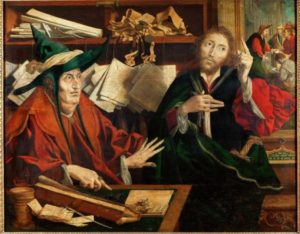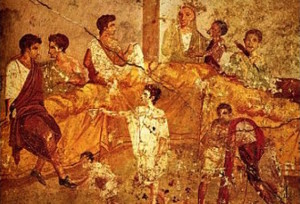Thoughts on Sunday’s Lessons for Sept. 22, 2019
First Reading (Track One): Jeremiah 8:18-9:1
“You cannot serve God and wealth.” Jesus speaks so often about the dangers of riches and our obligation to support the poor, as he does in Sunday’s Gospel, that we really need to take this message seriously.

Parable of the Unjust Steward (c.1540), oil painting by Marinus van Reymerswaele (c.1490-c.1546). Kunsthistorisches Museum, Vienna. (Click image to enlarge.)
This obligation to forgo riches while caring for the poor, widows, orphans, and strangers in our land is deeply rooted in the Torah that Jesus knew as his bible. We hear it in Sunday’s Track One first reading, as Jeremiah grieves with profound emotion over the people’s failure of at righteousness and justice. They hoard riches and ignore the poor. The prophet mourns deeply, imagining God’s own mourning: “Is there no balm in Gilead?”
First Reading (Track One): Amos 8:4-7
It shouldn’t be lost on any of us that the ancient prophets in the Hebrew Bible often sound angry because they have to bring the same message to the same people over and over again. In Sunday’s Track Two second reading, Amos echoes this stern prophetic chorus: The people languish in exile, their city in ruins and the temple destroyed. When we fail to take care of the poor and the needy, when we lie, cheat and steal and act as if we did nothing wrong, God grows angry, Jeremiah shouts. For such acts and omissions, there are consequences!
Psalm (Track One): Psalm 79:1-9
Sunday’s Track One psalm echoes Jeremiah’s weeping prophesy as mourns for desolate and shattered Jerusalem after the Exile. Jerusalem is rubble. The unburied bodies of martyred faithful are food for birds and beasts; their blood runs like water around the city. The people are the objects of scorn, and they feel only God’s fury blazing like fire. The Psalm (including four more verses that we won’t chant on Sunday) concludes with heartfelt prayers for God’s mercy and forgiveness.
Psalm (Track Two): Psalm 113
Even when the people won’t help the poor and the needy, the Psalmist sings, God will always do so. God is blessed through all eternity, we sing; God is worthy of praise. The psalm goes on: God sits high above all nations and above the heavens. Yet God also looks down and sees humanity … and reaches down to gently lift up the needy, the poor and the disappointed, gently placing them in seats at the tables of royalty.
Second Reading: 1 Timothy 2:1-7
Pray for everyone, and don’t neglect to pray for the kings and leaders of the community, urges the author of the first letter to Timothy. He enumerates for us four kinds of prayer: supplications, or specific requests; petitionary prayers, asking for help; intercessions, or urgent requests; and thanksgiving, expressing gratitude. Remember that God is one, the author tells us, and that Jesus – who was both divine and also human like us – gave himself for our salvation.
Gospel: Luke 16:1-13
This parable makes us stop and think, as good parables should. On the surface, it may appear to hold up dishonest behavior as a good thing because it gets results. Or does it? Jesus rarely speaks well of the rich, and particularly so in Luke. Could he be using the servant’s trickery, which deprived the rich man of part of his income, as mockery? If you cheat in small things, he says, who will trust you with serious business? Furthermore, don’t get the idea that Jesus has suddenly gone easy on the rich. In next week’s Gospel we’ll hear the parable that follows next: the familiar story about the tables turning between the rich man and the beggar Lazarus.
What are “Track 1” and “Track 2”?
During the long green season after Pentecost, there are two tracks (or strands) each week for Old Testament readings. Within each track, there is a Psalm chosen to accompany the particular lesson.
The Revised Common Lectionary allows us to make use of either of these tracks, but once a track has been selected, it should be followed through to the end of the Pentecost season, rather than jumping back and forth between the two strands.
For more information from LectionaryPage.net, click here.


